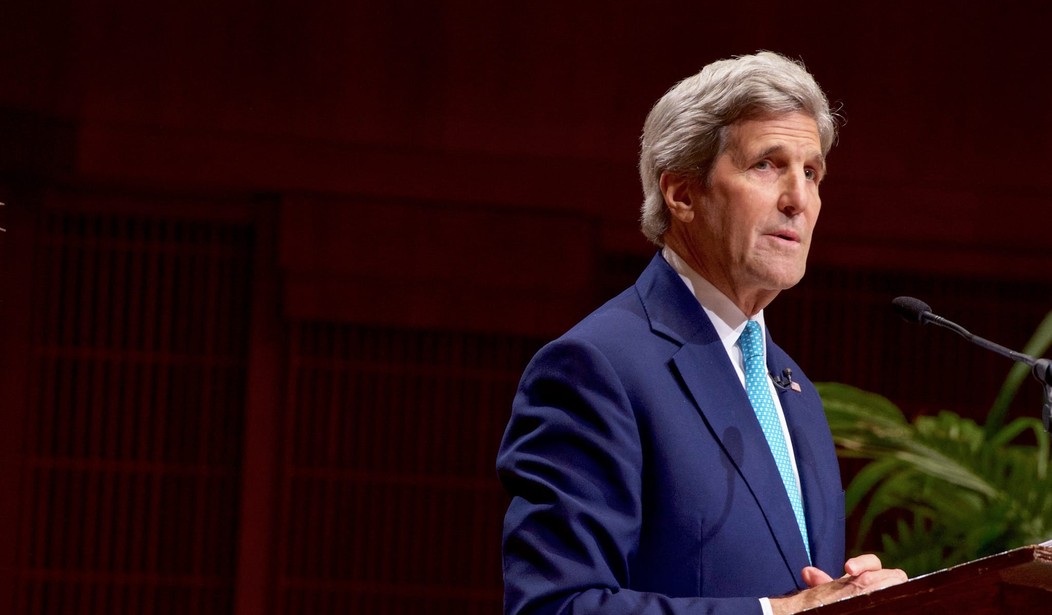In a speech on the role of religion in U.S. diplomacy, Secretary of State John Kerry slammed “despicable” efforts to “smear” Muslims “collectively for the actions of a few.”
Kerry stressed in a “disclaimer” near the beginning of his address at Rice University’s Baker Institute for Public Policy event that “the State Department is a secular institution and that, from its founding, the United States has maintained a formal separation, obviously, between church and state, and nothing that we’re doing seeks to or does cross any of those lines.”
“This means that in our foreign policy, we don’t advocate on behalf of any particular set of religious beliefs or express a preference for one faith over another — or even for religious belief over non-belief. But this doesn’t mean that religion is irrelevant to our approach to world affairs, and particularly in this globalized, different world we are living in today,” he said.
The Yale grad added that “if I had a chance to go back to college all over again, one of the subjects I would absolutely like to study is comparative religion.”
“Religion today remains deeply consequential, affecting the values, the actions, the choices, the worldview of people in every walk of life on every continent and, obviously, also here at home,” he said. “It is a part of what drives some to initiate war, others to pursue peace; some to organize for change, others to cling desperately to old ways, resist modernity; some to reach eagerly across the borders of nation and creed, and others to build higher and higher walls separating one group from the next.”
Kerry described interfaith outreach efforts by the State Department, which used to mean “having meetings almost exclusively with men — and usually very old men” but now include “a much more diverse group of figures.”
He noted that it’s “deeply disturbing today that Christians face persecution or repression in many countries, especially in the Middle East and parts of South Asia and Africa,” as well as the fact that “in Europe and elsewhere, anti-Semitism is again on the rise, as evidenced by a significant increase in hate crimes — many of them violent — and also frequent incidents of intimidation and examples of anti-Semitic graffiti and verbal abuse.”
The secretary then decried “anti-Muslim feelings” that are “on the rise” in Europe, and “troubling indications here in the United States, where some have urged a ban on Muslim visitors and where false stories about large numbers of Muslim Americans supposedly celebrating the 9/11 attacks have been willfully disseminated by people who don’t bother to check their facts.”
He didn’t mention Donald Trump by name.
Kerry argued that blaming all Muslims for the actions of some is “no more logical than it would have been in the 1990s to hold all Christians accountable for the atrocities committed against Muslim populations in Bosnia and Kosovo.”
“Now, sometimes I’m asked by people here at home, why don’t Muslim leaders speak out more boldly against terrorism? My reply is they do. They are. And too many people haven’t been listening. Political leaders from across the Muslim world have condemned Daesh, al-Qaida, Boko Haram, al-Shabaab, and many other terrorist groups, and they are part of our 66-nation coalition now in the fight against these terrorists. In addition, individual Muslim leaders, Sunni and Shia, on every continent, have stated clearly that terrorist acts of the type perpetrated by these groups are contrary to the letter and the spirit of Islam,” he said.
“The problem is that verbal condemnations aren’t enough. They don’t complete the job.”
Kerry added that “we still don’t have a fully satisfactory answer as to why some people — married, educated, older — fall under the lethal spell of terrorism,” but pointed to “pretty good clues” such as “political repression” and government corruption.
He turned his speech to global warming, and what religious leaders can do to “save our planet from the most harmful consequences of climate change.”









Join the conversation as a VIP Member